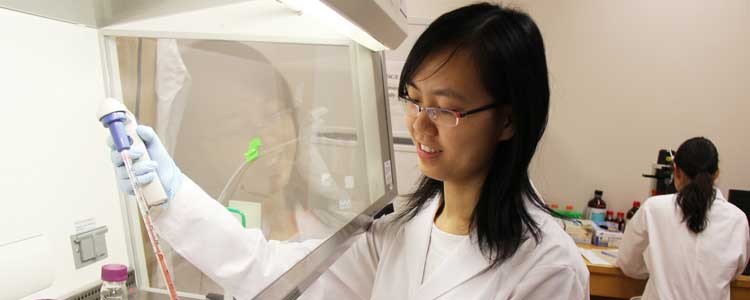
There’s no denying that co-op is an awesome way to gain experience in the workforce while getting your degree.
I mean, it’s one of the things Waterloo is most known for! But, Waterloo isn’t just for co-op students. There are tons of students, like me, who are in the regular, or non-co-op stream.
I chose the regular system of study so that I could graduate sooner (four years instead of five) and get to grad school faster. That doesn’t mean I’m not doing everything possible to gain the same amount of experience. So, let’s look at a few of the ways that I’ve been able to gain hands-on and practical experience relevant to my future career without being in co-op.
The value in volunteering
At Waterloo, there are over 200 clubs and services where you can explore your interests. Being involved with a club or service program in a leadership role is a great way to develop the interpersonal skills you’d get in the workplace — like teamwork, cooperation, and accountability. And because you often work with professors and staff, you can develop your professionalism, time management, and organizational skills, too.

Members of enTECH go to retirement homes to teach seniors how to use technology such as computers, smartphones, and tablets.
Take my two friends, Rahul and Erica, from the Campus Response Team. They're also part of a club called enTECH. Through enTECH, Rahul and Erica had the chance to explore their interest in technology and the way it intersects with their communities by teaching the elderly how to use different tools to stay connected with their families.
Through being involved with enTECH, holding executive positions on the Campus Response Team, and being primary first responders, they’ve both had the chance to work on confidence and leadership skills.
As a student who was constantly struggling with what to do after graduation, exploring volunteer positions has been invaluable in guiding me towards a future in nursing.
Making time for a part-time job
If you need to make bank because let’s be honest, school’s expensive, there are lots of part-time jobs on campus and within the city that can help beef up your résumé and give you valuable experience that can be transferred to any workplace setting.
My part-time job with Marketing and Undergraduate Recruitment as an ambassador for my faculty gives me the chance to connect with future students, explain what Waterloo has to offer, and explain why it may or may not be the right fit for them.
The position is a good chance to work on my organizational, accountability, and collaboration skills and has exposed me to new communications tools that I wouldn’t have known about otherwise. Both these practical and personal skills can be transferred to all different kinds of work place settings.

Getting involved on campus
Experiential learning is everywhere on campus and more often than not there’ll be an event or two each term that helps you grow your résumé.
Consider yourself a techie? A hackathon is a great example of experiential learning. If you’ve never participated in one, a hackathon is when students collaborate to build new web and mobile services. If we’re hosting, prepare to camp out on campus for a couple of days!
Waterloo’s Hack the North is a great example – it’s so big that Prime Minister Justin Trudeau delivered the opening remarks one year! In addition to the swag, food, and connections, hackathons are a great way to practice working in a team environment and towards a common goal.
If you want to get down to business, Waterloo hosts tons of networking events where you can connect with hiring managers, directors, and organizations. Simran, a good friend of mine (who also happens to be Waterloo's business ambassador), says attending these network events goes a long way if you're thinking about non-co-op opportunities, like summer internships.
To build on what Simran said, networking can land you an internship and/or job that’ll help you gain experience in your area of interest. Being able to communicate with other people and pitch your skills and abilities while you’re networking is a skill that will definitely help you in the long run.

Preparing for the future through sports
Imagine waking up, going to practice, attending classes, studying for exams, competing, doing homework, and going back to sleep. This is the cycle that our varsity Warrior athletes go through almost daily.
Although an athlete's days may sound exhausting and jam packed, there’s definitely a silver lining to it. Being an athlete and a full-time student means that you are 100% locked into training your hardest and representing the school in the same way. It teaches you resilience, balance, discipline, and time management – all great skills that would make a great employee in any work environment.
One of my good friends Tori is starting her fourth year on the varsity figure skating team while completing her degree in Biology. Her time as a varsity athlete taught her a strong work ethic that employers value and has ultimately helped her land some awesome co-op jobs, like a position at St. Michael’s Hospital in Toronto and helping with research here on-campus.
I've been able to balance school, skating, and work, and employers really value that ability.
Do your research
Waterloo is known as Canada’s innovation university and rightfully so. Professors and students work every day to find solutions to problems that affect our society. As a result, professors often look for students to volunteer in their labs as research assistants.
Working on a research project is a great way to build up your technical and project management skills and can show employers you understand how small pieces can fit into a big puzzle. While a lot of research is done on a voluntary basis, there are some paid positions (especially in the spring term — hello, field season!).
So, there you have it! There are many ways outside of co-op to get all the experiential learning you could want. It takes work — no one will just give you these opportunities. Be prepared and get ready to work for them. Try some, or all of the suggestions above. You never know what kinds of doors they’ll open!
![]()
![]()




